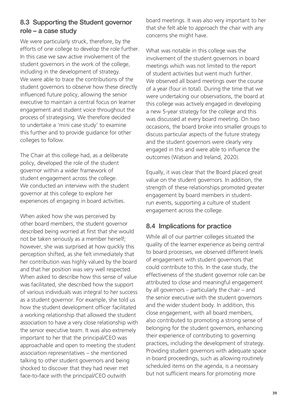
39
8.3��Supporting�the�Student�governor�
role�-�a�case�study
We were particularly struck, therefore, by the
efforts of one college to develop the role further.
In this case we saw active involvement of the
student governors in the work of the college,
including in the development of strategy.
We were able to trace the contributions of the
student governors to observe how these directly
influenced future policy, allowing the senior
executive to maintain a central focus on learner
engagement and student voice throughout the
process of strategising. We therefore decided
to undertake a 'mini case study' to examine
this further and to provide guidance for other
colleges to follow.
The Chair at this college had, as a deliberate
policy, developed the role of the student
governor within a wider framework of
student engagement across the college.
We conducted an interview with the student
governor at this college to explore her
experiences of engaging in board activities.
When asked how she was perceived by
other board members, the student governor
described being worried at first that she would
not be taken seriously as a member herself;
however, she was surprised at how quickly this
perception shifted, as she felt immediately that
her contribution was highly valued by the board
and that her position was very well respected.
When asked to describe how this sense of value
was facilitated, she described how the support
of various individuals was integral to her success
as a student governor. For example, she told us
how the student development officer facilitated
a working relationship that allowed the student
association to have a very close relationship with
the senior executive team. It was also extremely
important to her that the principal/CEO was
approachable and open to meeting the student
association representatives - she mentioned
talking to other student governors and being
shocked to discover that they had never met
face-to-face with the principal/CEO outwith
board meetings. It was also very important to her
that she felt able to approach the chair with any
concerns she might have.
What was notable in this college was the
involvement of the student governors in board
meetings which was not limited to the report
of student activities but went much further.
We observed all board meetings over the course
of a year (four in total). During the time that we
were undertaking our observations, the board at
this college was actively engaged in developing
a new 5-year strategy for the college and this
was discussed at every board meeting. On two
occasions, the board broke into smaller groups to
discuss particular aspects of the future strategy
and the student governors were clearly very
engaged in this and were able to influence the
outcomes (Watson and Ireland, 2020).
Equally, it was clear that the Board placed great
value on the student governors. In addition, the
strength of these relationships promoted greater
engagement by board members in studentrun events, supporting a culture of student
engagement across the college.
8.4��Implications�for�practice
While all of our partner colleges situated the
quality of the learner experience as being central
to board processes, we observed different levels
of engagement with student governors that
could contribute to this. In the case study, the
effectiveness of the student governor role can be
attributed to close and meaningful engagement
by all governors - particularly the chair - and
the senior executive with the student governors
and the wider student body. In addition, this
close engagement, with all board members,
also contributed to promoting a strong sense of
belonging for the student governors, enhancing
their experience of contributing to governing
practices, including the development of strategy.
Providing student governors with adequate space
in board proceedings, such as allowing routinely
scheduled items on the agenda, is a necessary
but not sufficient means for promoting more